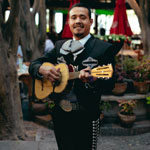Mariachi Day Date in the current year: January 21, 2026
 Mariachi Day is a celebration of Mexican music and culture that is observed annually on January 21. This holiday doesn’t have any official status, but if you love mariachi music, you absolutely should celebrate it.
Mariachi Day is a celebration of Mexican music and culture that is observed annually on January 21. This holiday doesn’t have any official status, but if you love mariachi music, you absolutely should celebrate it.Mariachi is a genre of Mexican music that emerged in western Mexico in the 18th century. It developed from son, a folk musical style featuring string instruments that had been introduced to Mexico by the Spanish, and was originally known as son jalisciense. Early mariachis played only string instruments and dressed in peasant clothing (shirts, white pants and sandals).
The transition from son jalisciense to mariachi occurred during the 19th century. By the end of the century, the state of Jalisco was the center of mariachi music. The main difference between son jalisciense and modern mariachi is that the latter was more heavily influenced by European music with its waltzes and polkas. At the time, mariachi was still played primarily in rural areas.
The development of the “urban” form of mariachi began in the early 20th century, following its introduction to Mexico City by farm workers who moved to the city in search of better lives. They settled around Plaza Garibaldi that has since been known as the home of mariachi music in Mexico City. Mariachis played in restaurants and plazas, as well as at various family events.
After the victory of the Mexican Revolution in 1920, the new Mexican government started looking for ways to create a unified national identity and promote Mexican culture. Mariachi music and musicians were chosen as an international symbol of Mexican identity. Around the same time, mariachi performers adopted charro outfits, based on the clothing of Mexican horse riders and consisting of decorated pants and a short jacket, a silk tie, and a wide-brimmed sombrero hat. In 2011, mariachi music was added to UNESCO’s Representative List of the Intangible Cultural Heritage of Humanity.
A mariachi group typically includes at least one guitar (usually vihuela), one guitarrón (acoustic bass guitar), two trumpets, and up to eight violins. All players take turns singing lead and backup vocals. Song and dance styles performed by mariachi bands include ballads, boleros, chotis, corridos, cumbias, danzones, huapangos, jarabes, joropos, marches, pasodobles, polkas, sones, rancheras, and waltzes.
The origins of Mariachi Day are unclear, and the holiday doesn’t seem to be particularly widespread. Mariachis themselves regard the feast day of their patroness Saint Cecilia, observed on November 22, as their “professional holiday”. However, you shouldn’t let this stop you from celebrating mariachi music on January 21 if you want to.
You can observe Mariachi Day by learning more about the history of mariachi music and the lives of famous mariachis, listening to mariachi bands, watching a movie that features mariachis and Latin music (Disney’s Coco is a great example), attending a mariachi concert if there is one near you, and spreading the word about this amazing holiday on social media with the hashtag #MariachiDay.
- Category
- Cultural Observances, Unofficial Holidays
- Country
- Mexico
- Tags
- Mariachi Day, unofficial holidays, cultural observances, mariachi music, Mexican music